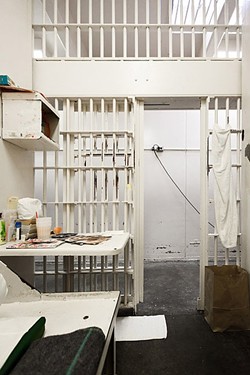Law and order: SLO County joined rest of California voters in passing Proposition 57
By Chris McGuinness[{
"name": "Ad - Medium Rectangle CC01 - 300x250",
"id": "AdMediumRectangleCC01300x250",
"class": "inlineCenter",
"insertPoint": "8",
"component": "2963441",
"requiredCountToDisplay": "12"
},{
"name": "Ad - Medium Rectangle LC01 - 300x250",
"id": "AdMediumRectangleCC01300x250",
"class": "inlineCenter",
"insertPoint": "18",
"component": "2963441",
"requiredCountToDisplay": "22"
},{
"name": "Ad - Medium Rectangle LC09 - 300x250",
"id": "AdMediumRectangleLC09300x250",
"class": "inlineCenter",
"insertPoint": "28",
"component": "3252660",
"requiredCountToDisplay": "32"
}]
On Nov. 8, voters in SLO County and across California once again got the chance to decide just what the future of the state’s criminal justice system would look like.
This year, voters were asked to weigh in on a sentencing reform initiative that could have a substantial impact on that system.
With its passage, Proposition 57 will increase the number of inmates in state prisons who are eligible for parole after serving the full prison term for their primary crimes—but before they serve additional time tacked on from other crimes and sentencing enhancements. The measure will also allow the California Department of Corrections and Rehabilitation to award sentencing credits to inmates for good behavior who are working toward their rehabilitation while in prison. In addition, it also allows judges, not prosecutors, to determine if minors accused of crimes can be tried as adults.
California Gov. Jerry Brown and other prison reform advocates, who claim that the measure’s passage will reduce overcrowding in state prisons and save the state’s taxpayers millions of dollars, staunchly supported the proposition. Those who opposed the measure, including SLO County District Attorney Dan Dow, warned that the measure would put dangerous criminals back on the streets, due to the state’s definition of a “non-violent” offense being too broad.
More than 6.8 million Californians voted to approve the measure, representing 63.7 percent of the total vote, according to preliminary election results from the California Secretary of State’s Office. SLO voters also approved the measure, which passed in the county with more than 61 percent of the vote, according to preliminary ballot totals.
In the aftermath of the proposition’s passage, Dow issued a statement saying he was “deeply saddened” by the vote and that he believed voters were misled by special interests backing the proposition.
“The initiative system must be changed immediately to ensure in the future that voters are given the truth by an objective and independent third party,” Dow said. “Sadly, an individual or group with millions of dollars and a few nice sounding buzzwords can buy the necessary votes to create a bad law by crafting a message that sounds great but in reality is not truthful. Much progress made in the last 40 years in California to hold career criminals accountable has just been thrown out the window.”
According to the Secretary of State’s Office, more than $19.8 million was raised in support of the proposition, with just $1.6 million raised to oppose it. Top contributors supporting the proposition include Governor Brown’s Ballot Measures Committee with more than $4 million and the California Democratic Party with more than $2 million.
But not everyone in the law enforcement or criminal justice communities feels the same way. The Chief Probation Officers of California organization lobbied in support of Proposition 57 during the election and asserts that its passage was an opportunity for a “continuum of true rehabilitation” in the state’s prison system.
“For probation officers on the street, we expect to see a much better person that comes to us for community supervision,” Banini told New Times.
The passage of the proposition comes on the heels of other major prison reform efforts, including a prison realignment initiative in 2011 and the voter-approved Proposition 47 in 2014, which reduced some non-violent felony crimes to misdemeanors. Banini said that Californians’ attitudes about criminal justice reform might be changing as they realize that an estimated 95 percent of criminal offenders are coming back into society before serving their full sentence.
“I think [voters] are starting to see that they’re coming, so we better have them prepared as best we can while they are in custody and prepared for when they get out,” he said.
In addition to Proposition 57, voters in California also addressed two criminal justice-related ballot measures. Voters in SLO and California voted down a ballot initiative that would have ended the use of the death penalty in the state, and narrowly voted in favor of another measure that will streamline the appeals process in death penalty cases in the state.
Staff Writer Chris McGuinness can be reached at [email protected], or on Twitter at @CWMcGuinness.
Latest in News
Readers also liked…
-

Coast Unified teachers upset over new position's salary and qualifications
Oct 20, 2022 -

SLO police identify alleged driver who hit and killed couple
Dec 22, 2022 -

When the levee breaks: Oceano residents, county officials walk a tightrope of regulations to manage Arroyo Grande Creek, which some say led to the levee's failure in January
May 18, 2023









